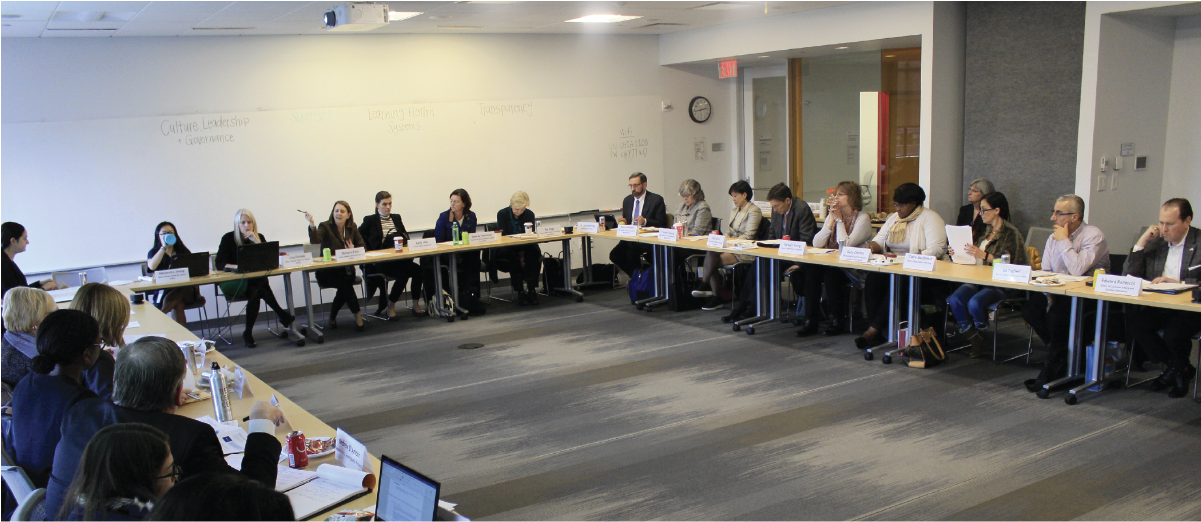Massachusetts’ Safety and Quality Consortium is growing, making headway
Less than six months into its work, the Massachusetts Healthcare Safety and Quality Consortium has grown to more than 35 organizations and has started to coalesce around the key aspects of patient safety that are ripe for transformation in Massachusetts.
Representing the voice of patients, health plans, state agencies, licensing boards, hospitals, pharmacies, nursing homes, clinicians and numerous other stakeholders in the health care system, the Consortium is deliberating on a series of goals aimed at aligning priorities, incentives and efforts to dramatically reduce the number of preventable medical errors in the state.
Both here and nationally, the most visible efforts to improve patient safety have been focused on hospitals. Intentionally, the Consortium has a broad membership that includes representatives from long-term care, community health centers, and more. This expansion in scope is especially critical since more and more patients receive their care in outpatient settings.
The Consortium’s first task is to build a strategic framework or “roadmap” that sets goals and objectives for four cross-cutting and interdependent "pillars" of safety:
- Culture, leadership and governance
- Support for patients, clinicians and staff
- Learning health systems
- Transparency and measurement

“This work is very much needed. It’s been frustrating to a lot of people and me personally to see years and years of patient safety work and not enough progress to show for it,” says Nicola Truppin, Founder of Health Navigator Partners and a volunteer patient advisor at Beth Israel Deaconess Medical Center. “I’m pleased to be a member of the group and am very eager to see what we are able to accomplish by working together.”
Massachusetts is the first state in the country to map out a collective plan for accelerating progress in reducing medical errors, which cost the state’s health care system more than $600 million in a single year and disrupts the health and lives of thousands of Massachusetts families yearly.
“Everyone has a role to play in improving the quality and safety of health care.”
“Patient safety is an important priority for us,” says Milagros Abreu, M.D., M.P.H., President, Chief Executive Officer and Founder of The Latino Health Insurance Program and a new member of the Consortium. She notes that her organization is particularly focused on helping to reduce disparities in health care experience and to improve medical outcomes in Massachusetts.
“We have been working with patients and families for many years to engage them in the health care system and to be proactive about their health. Our organization can be an important asset to the Consortium as it seeks input from the community,” she adds. “Everyone has a role to play in improving the quality and safety of health care.”
The group is actively discussing best ways to set measurable goals in all four of the cross-cutting areas of focus. It is also grappling with best ways to define the roles that all individuals in the health care system can play in this multi-year effort to elevate patient safety to the top of the health care agenda.
The Consortium will continue meeting through the winter to reach consensus on a set of goals and priorities. Its next steps will be to convene a series of work groups tasked with developing action plans for executing the priorities identified in the "roadmap."
“It’s encouraging to see so many thoughtful, engaged individuals and organizations around the table raising good questions and collectively seeking solutions,” says Barbara Fain, Executive Director of the Betsy Lehman Center, which is convening the Consortium. “If this were easy work, it would have already been accomplished, so we’re grateful to so many for their commitment to work hard and help Massachusetts lead the way on patient safety.”
What is the Consortium?
The Massachusetts Healthcare Safety and Quality Consortium is a public-private partnership with members from more than 35 health care organizations, as well as representation from the patient and family community representing all state residents as stakeholders in the health care system.
Why was it convened?
Recent research by the Betsy Lehman Center indicates that while Massachusetts is home to some of the premiere medical institutions in the country, preventable medical errors continue to occur on a daily basis — costing the health care system millions of dollars every year and impacting the medical, financial, and emotional health of thousands of patients and their families. The research served as a catalyst for the Consortium by highlighting the need for a determined, collective approach to this persistent public health problem.
What will the Consortium do?
The Consortium, which began meeting in July of 2019 and will continue work into 2020 and beyond, is overseeing the development of key goals and strategies for dramatically driving down the incidence of medical error in all care settings in the state. Rather than approach safety challenges on a risk-by-risk basis, the Consortium aims to create a series of recommendations and conditions that will guide health care provider organizations in efforts to transform the way they deliver care so that is safe and effective.
Is there a way that I can be involved?
The Consortium is in the early stages of laying out a “roadmap” to improve the safety of the health care system. The work is organized around four key dimensions of safety: culture, leadership and governance; learning health systems; patient, clinician and staff wellbeing and transparency and data. By spring of 2020, the Consortium will be seeking volunteers to attend forums, serve as task force members, and join other activities aimed at further defining and translating the priority goals into effective action items.